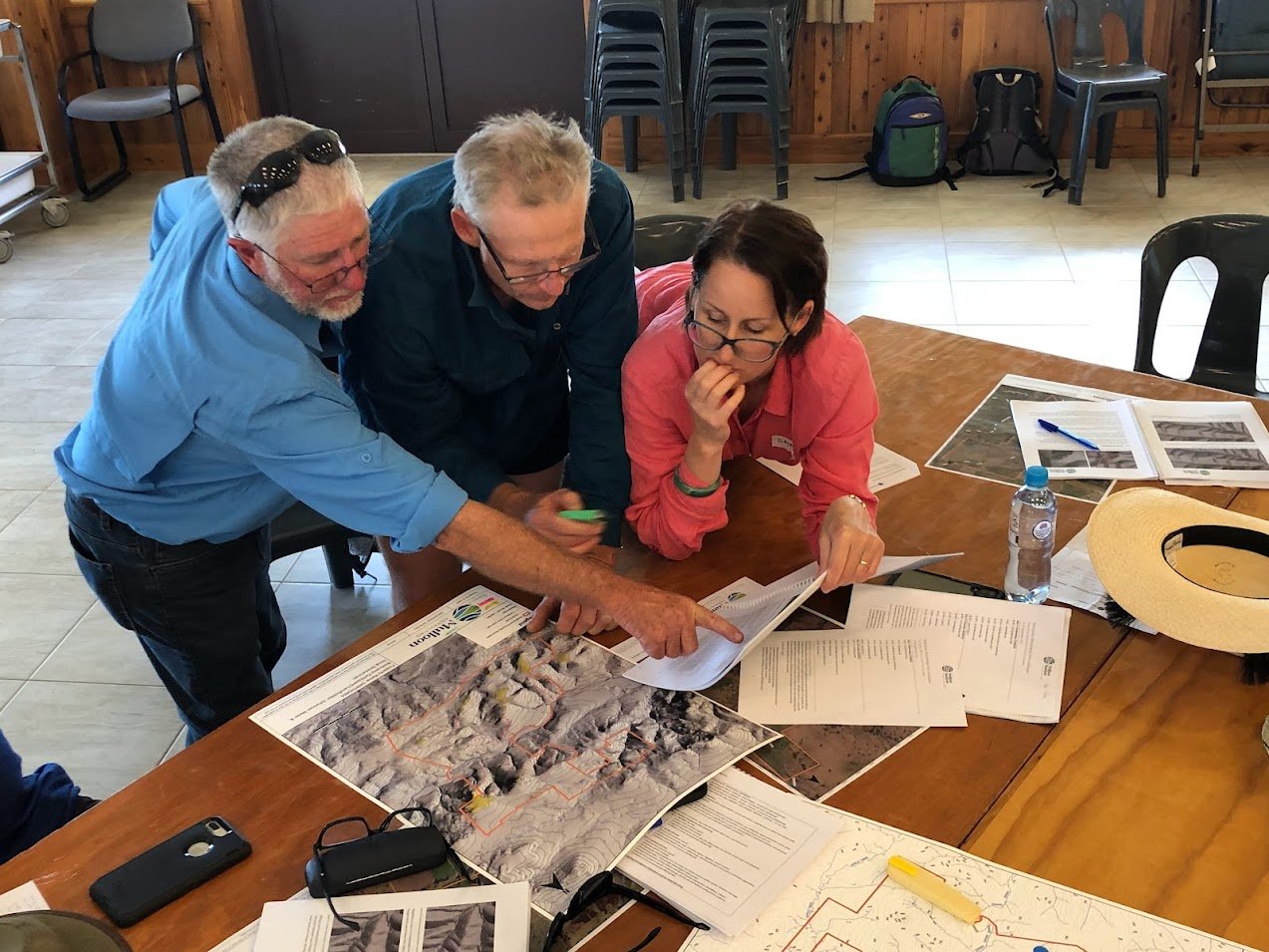Landscape Rehydration CoPP kicks off in Inverell, NSW
Learning to use a laser level for project design.
It’s the last week in September and the Mulloon Institute’s Learning Programs team is at Danthonia, a 2,350 ha beef farm owned by the Bruderhof community near Inverell, NSW.
The surrounding district is dry but here water is flowing in the stream and there’s good perennial pasture cover thanks to practices including holistic grazing, landscape rehydration and soil restoration.
The green, hydrated pasture at Danthonia.
The community hall is buzzing with over 30 farmers and NRM managers joining in animated group discussions on the role of plants in the landscape. Feeding soil biology, improving rainwater infiltration and slowing down run-off all get a mention as farmers participate in the first activity of the Mulloon Institute’s Landscape Rehydration Bootcamp.
This is the first of five bootcamps we’re hosting around the country as part of our new Communities of Practice Project (CoPP) funded by the Australian Government’s Future Drought Fund. Hosted by GWYMAC Landcare and Northern Tablelands LLS, the farmers have come from the Swanbrook Catchment and surrounds to learn how to improve their drought resilience by restoring the movement, storage and cycling of water on their farms.
As the two-day landscape rehydration Bootcamp proceeds, theory sessions, practical activities and experiences in the field work hand-in-hand to build concepts and skills for landscape rehydration.
Landscape Planner Erin Healy and Principal Landscape Planner Peter Hazell create a friendly, participatory atmosphere perfect for shared learning. As one farmer said, “I have so many questions. It’s good to bounce ideas with like-minded people.”
Out in the field the farmers learn to observe how the landscape has been shaped by water, gravity, geology, and biodiversity over deep time. They identify landscape zones; assess the trajectory and discuss strategies for intervention.
Hands-on activities reinforced theory sessions.
There’s healthy competition during the hands-on activities. Teams build models of intact catchments, degrade them with land-use practices then repair them using strategies learnt at the Bootcamp.
Participants are also introduced to desktop mapping analysis to determine landscape features, stream order and catchment boundaries. They learn how to calculate catchment size, flood probability and the potential force of water, used to assess risk and design successful projects.
Mapping contours and catchment boundaries helps to assess risk.
There is time for personal reflection on the vision and priorities for their own farms, which will be further developed during the mentoring program available to participants through CoPP.
By the end of the Bootcamp, participants head home with a toolkit of low-risk, physical interventions that can be built with natural materials, equipment and labour available on their farms.
With an El Nino system announced and the prospect of another drought, there’s a positive feeling that instead of being at the mercy of the weather, farmers can take steps to actively capture, store and utilise water when it rains.
Our hosts summed up the mood in their closing remarks. Johannes Meier, farm manager at host property Danthonia noted, “We’ve got some tools over the last few days - let’s make sure we use them and keep this work going.”
The power of catchment-scale landscape rehydration at neighbouring farms was captured by ecological farmer Glenn Morris, “It’s good we’ve all come together across the catchment - we’ll have clouds hovering above Swan Brook.” Mick Mather, Chair of GWYMAC Landcare concluded, “Let’s show the greater community that we’re making changes and doing things differently.”
Communities of Practice Project is backed by the Australian Government's Future Drought Fund. Mulloon Institute’s Learning Programs have been developed with the assistance of the NSW Government’s Environmental Trust.
To find out more about the Mulloon Institute’s landscape rehydration Communities of Practice Project, click here to sign up for newsletters, or call Jono Forrest on 0429 689 615.
The field day, bootcamp and mentoring program will be delivered in Inverell NSW, Emerald QLD, Darwin NT, Perth WA and the Bass Coast of Victoria. Our goal is to bring more districts into the program if suitable partnerships can be established.




